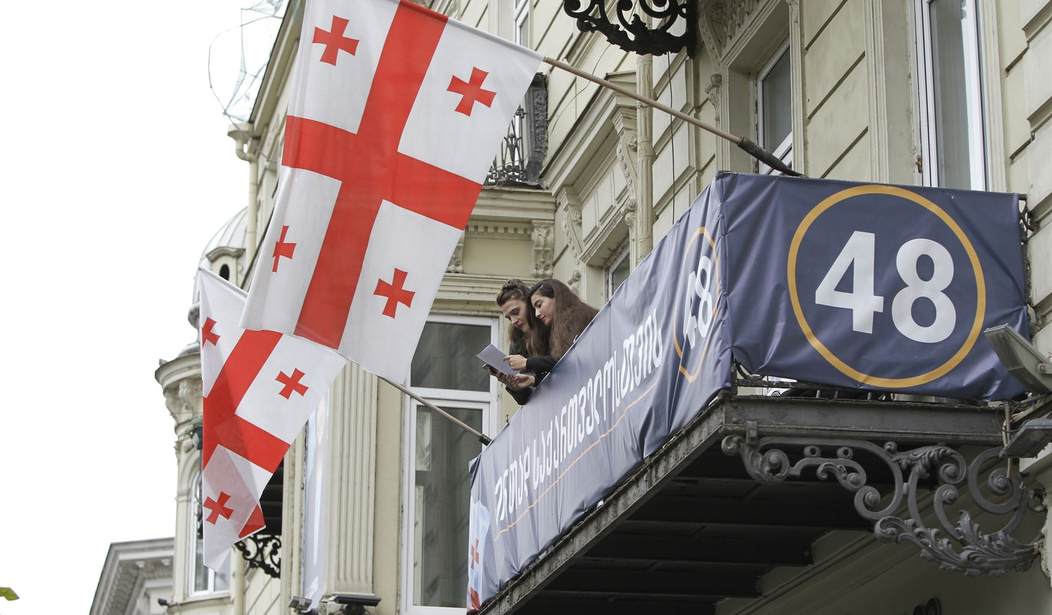From August 11 to 14, I attended the Liberty International World Conference in Tbilisi. Libertarians from 19 countries discussed how to achieve more freedom.
Heated discussions on the war in Ukraine
There was a passionate discussion about the war in Ukraine. Of course, everyone condemned Russia’s war of aggression, but a member of the Libertarian Party from the USA opposed supporting Ukraine with weapons. Some sections of the libertarian movement in the USA are committed to pacifist and/or isolationist positions. The argument of the libertarian from the USA: In American history, war only ever leads to an extreme strengthening of the state.
There was also a member of Russia’s libertarian party, which has seen about a third of its members emigrate, many to Georgia. Others are in prison. Members of the Russian libertarian party are overwhelmingly critical of the war. Most libertarians in Europe are clearly on the side of Ukraine anyway. “Our ultimate goal is not peace, but freedom,” said a libertarian from Poland. Ultimately, she stated, only Russia benefits from a pacifist stance.
Making the case for open borders
Are “libertarians” on the right or the left of the political spectrum? Hearing them talk about socialism and capitalism, some might place them on the right. But on the other hand, there are many, but not all, libertarians who ardently support open borders and unrestricted immigration. One of the best-known libertarians is American Ken Schoolland, a professor of economics who lives in Hawaii. “Embracing the Freedom of Refugees” was the topic of his talk. Every entrepreneur, Schoolland argues, should be free to hire whichever employees he wants and who he thinks are best – regardless of their nationality. He rejects giving priority to U.S. citizens over immigrants from Latin America, for example. No one should have better chances of getting a job just because they were born in a certain country. I myself only partly agree with these opinions. The welfare state, of which he disapproves, is a reality and understandably attracts large numbers of immigrants from other countries. The combination of a welfare state and open borders is clearly economically impossible. And anyone in favor of freedom should also accept it when the majority of people in a country want to set maximum limits for the admission of migrants – for whatever reasons.
Recommended
The horrors of the Cultural Revolution
Ken Schoolland’s wife Li is also one of the best-known speakers on the libertarian scene. She gave a harrowing talk about her life in China from 1958 to 1984. Those were the worst decades to be living in China because 1958 marked the beginning of Mao’s “Great Leap Forward,” the largest-scale socialist experiment in human history, in which some 45 million Chinese citizens perished. In 1966, when she was eight years old, Mao’s next campaign began, the “Great Proletarian Cultural Revolution,” which plunged the country into chaos for the next ten years. Her father, a surgeon, was thrown in jail for making a politically incorrect joke, and her mother, a professor, was publicly humiliated. The Red Guards asked 9-year-old Li and her 8-year-old brother to report what their mother had said against the Communists. The two children refused. Their silence was taken as evidence against the mother. Their refusal to denounce their mother, in the eyes of the Red Guards, proved that she had told them not to obey the authorities. Other children had even more traumatic experiences: one child, for example, had to watch as dynamite was tied around his father and he was blown up in public.
Big tech – a threat to freedom?
Another topic was a panel discussion on “Is Big Tech a Threat to Freedom?” This session saw a clash of different opinions. On one side, there are libertarians who advocate anti-trust policies against monopolies and cartels to limit the power of companies such as Google, Facebook, Amazon and Apple. On the other side, economists who point out that today’s seemingly omnipotent “monopolies” will by no means be as omnipotent in the long run and will lose their power someday, just as Xerox, IBM, Kodak, Nokia, and many others did in the past. The greatest enemy of monopolies is capitalism itself, not state anti-monopoly legislation.
Socialists have a better understanding of marketing
Libertarians are a small group and their influence on politics, the public and the media – despite the many think tanks that exist worldwide – is limited. The Swede Per Bylund put it in a nutshell in his lecture: Although we libertarians understand the market better than socialists, socialists are much better and more successful in the market of public opinion. The libertarian message of freedom, he said, is often too abstract and does not reach people. Libertarians talk a lot about entrepreneurship, but fail when it comes to their own ideas. “Who is the customer? What is the product?” – these questions that every entrepreneur has to answer in order to be successful. What is the benefit for the public at large, how, in real terms, can more “freedom” improve their lives? “Think of the libertarian movement as a business that provides a valuable product, not as a non-profit or charity,” he recommended.
Free cities – libertarian islands
Jan Bertram, a speaker from the Free Cities Foundation, outlined the concept behind Free Cities and showcased a number of real-world examples. Ideally, Free Cities are cities with their own police forces and prisons, their own laws and their own tax systems. Libertarian islands, so to speak, within countries governed by a completely different state constitution. Relations between cities and their citizens should be governed exclusively on the basis of treaties. In the event of conflicts, these would be adjudicated by a third party – he cited international arbitration courts as a model. Bertram admitted, of course, that something like this would be difficult to imagine in countries like the United States or Europe today. There are, however, model projects that do not correspond completely with the ideal of free cities, but in some respects come close, such as the Dubai International Finance Center. There are two model projects in Honduras, but there is a danger that they will be abolished, because the socialists come to power in this country.
Georgia: A libertarian professor of politics loves being provocative
Georgia itself also has a libertarian movement, and its own libertarian party, Girchi – More Freedom, which was represented at the conference by the professor of politics Zurab Japardize. He is popular among young Georgians and hated by many older voters because, for example, he advocates the legalization of drugs and is a vocal supporter of LGBTQ rights. He also opposes universal conscription. At a time where 20 percent of the country is occupied by Russia, many people are afraid of another Russian attack in the wake of the war in Ukraine, this has turned many people against him. He points out that he is in favor of strengthening the army and joining NATO, but considers universal conscription to be an unsuitable approach.
As a ploy to get around conscription, he has even founded his own “religion” and appointed 70,000 “priests,” who are exempt from conscription. Not all libertarians at the conference are supportive: One Georgian woman sharply attacks Zurab Japardize, saying that refusing military service objectively benefits only one person: Putin.
“Free the world by freeing yourself”
My favorite talk was given by the daughter of Ken and Li Schoolland, KenLi Schoolland. The title of her session was “Free the World by freeing yourself” and her core message was: don’t feel like a victim of society and don’t wait for society to change, start with yourself. “When we want to reduce the power of the state, we have to strengthen the individual.” And, “It is not a good idea to bet all your freedom on political freedom.” Two sentences that perhaps sum up quite well what libertarians stand for.
Rainer Zitelmann is author of the books “The Power of Capitalism” https://the-power-of-capitalism.com/ and “Hitler’s National Socialism” https://hitlers-national-socialism.com/

























Join the conversation as a VIP Member